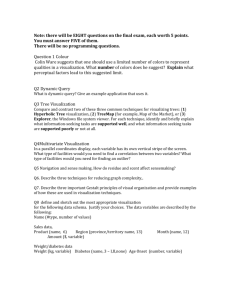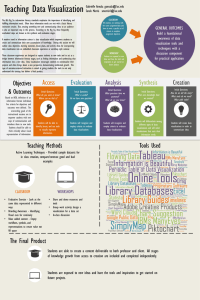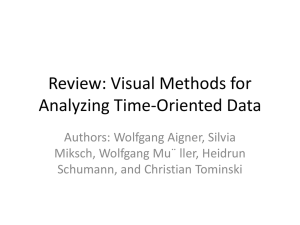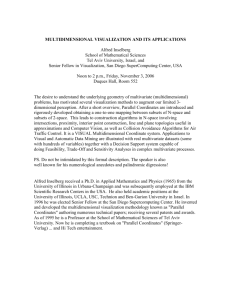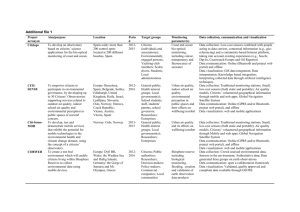- Tetherless World Constellation
advertisement
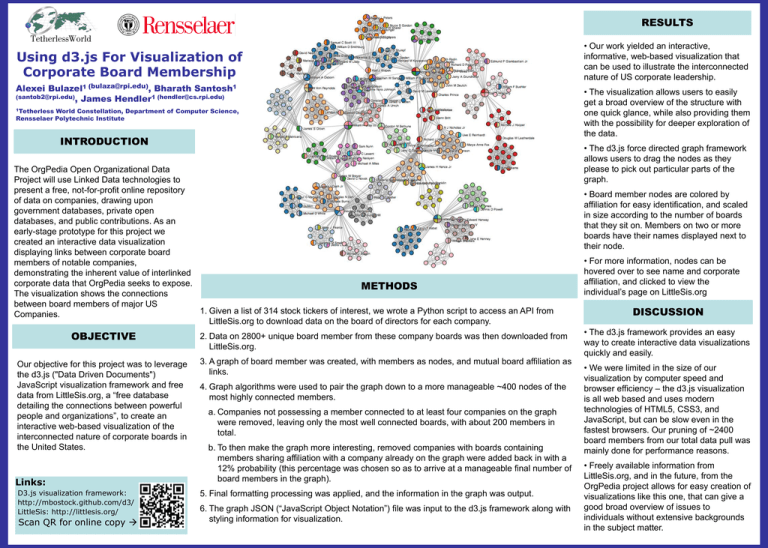
RESULTS Using d3.js For Visualization of Corporate Board Membership Alexei Bulazel1 (bulaza@rpi.edu), Bharath Santosh1 (santob2@rpi.edu), James Hendler1 (hendler@cs.rpi.edu) 1Tetherless World Constellation, Department of Computer Science, Rensselaer Polytechnic Institute INTRODUCTION The OrgPedia Open Organizational Data Project will use Linked Data technologies to present a free, not-for-profit online repository of data on companies, drawing upon government databases, private open databases, and public contributions. As an early-stage prototype for this project we created an interactive data visualization displaying links between corporate board members of notable companies, demonstrating the inherent value of interlinked corporate data that OrgPedia seeks to expose. METHODS The visualization shows the connections between board members of major US 1. Given a list of 314 stock tickers of interest, we wrote a Python script to access an API from Companies. LittleSis.org to download data on the board of directors for each company. OBJECTIVE 2. Data on 2800+ unique board member from these company boards was then downloaded from LittleSis.org. Our objective for this project was to leverage the d3.js ("Data Driven Documents") JavaScript visualization framework and free data from LittleSis.org, a “free database detailing the connections between powerful people and organizations”, to create an interactive web-based visualization of the interconnected nature of corporate boards in the United States. 3. A graph of board member was created, with members as nodes, and mutual board affiliation as links. Links: D3.js visualization framework: http://mbostock.github.com/d3/ LittleSis: http://littlesis.org/ Scan QR for online copy 4. Graph algorithms were used to pair the graph down to a more manageable ~400 nodes of the most highly connected members. a. Companies not possessing a member connected to at least four companies on the graph were removed, leaving only the most well connected boards, with about 200 members in total. b. To then make the graph more interesting, removed companies with boards containing members sharing affiliation with a company already on the graph were added back in with a 12% probability (this percentage was chosen so as to arrive at a manageable final number of board members in the graph). 5. Final formatting processing was applied, and the information in the graph was output. 6. The graph JSON (“JavaScript Object Notation”) file was input to the d3.js framework along with styling information for visualization. • Our work yielded an interactive, informative, web-based visualization that can be used to illustrate the interconnected nature of US corporate leadership. • The visualization allows users to easily get a broad overview of the structure with one quick glance, while also providing them with the possibility for deeper exploration of the data. • The d3.js force directed graph framework allows users to drag the nodes as they please to pick out particular parts of the graph. • Board member nodes are colored by affiliation for easy identification, and scaled in size according to the number of boards that they sit on. Members on two or more boards have their names displayed next to their node. • For more information, nodes can be hovered over to see name and corporate affiliation, and clicked to view the individual’s page on LittleSis.org DISCUSSION • The d3.js framework provides an easy way to create interactive data visualizations quickly and easily. • We were limited in the size of our visualization by computer speed and browser efficiency – the d3.js visualization is all web based and uses modern technologies of HTML5, CSS3, and JavaScript, but can be slow even in the fastest browsers. Our pruning of ~2400 board members from our total data pull was mainly done for performance reasons. • Freely available information from LittleSis.org, and in the future, from the OrgPedia project allows for easy creation of visualizations like this one, that can give a good broad overview of issues to individuals without extensive backgrounds in the subject matter.
